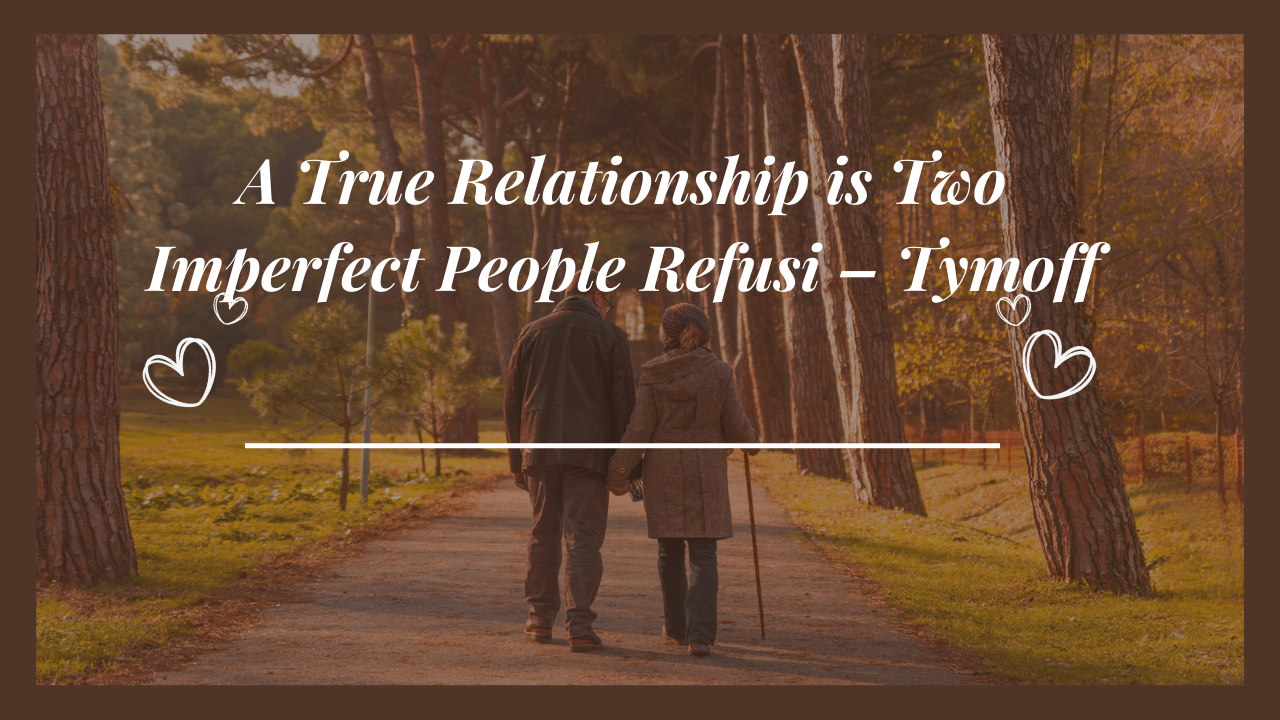
Introduction:
a true relationship is two imperfect people refusi – tymoff, “A true relationship is two imperfect people refusing to give up on each other.” These profound words, attributed to “tymoff,” encapsulate the essence of authentic connections built on acceptance, resilience, and unconditional love. In a world where perfection is often glorified, this quote serves as a powerful reminder that true intimacy and connection emerge not from flawlessness, but from embracing imperfection. In this article, we will explore the depth and significance of this quote, examining its implications for relationships, personal growth, and the human experience.

The Nature of Imperfection:
In a society that idealizes perfection and success, the notion of embracing imperfection may seem counterintuitive. However, imperfection is an inherent aspect of the human condition. We are all flawed, vulnerable, and prone to making mistakes. Yet, it is precisely these imperfections that make us uniquely human and capable of forming genuine connections with others.
Must Read=c.w. park usc lawsuit
Embracing imperfection does not mean resigning oneself to mediocrity or complacency. Rather, it involves accepting ourselves and others as we are, with all our strengths and weaknesses. It is about acknowledging that growth and self-improvement are ongoing processes, and that perfection is an unattainable ideal.
The Essence of True Relationships:
At the heart of the quote lies the concept of true relationships—connections that are characterized by authenticity, empathy, and unwavering support. A true relationship is not defined by the absence of conflict or imperfection, but by the commitment of two individuals to navigate life’s challenges together, with honesty and compassion.
In a true relationship, both partners recognize and accept each other’s flaws and shortcomings. Rather than trying to change or fix one another, they embrace each other’s imperfections as integral parts of their identity. This acceptance fosters a sense of trust, security, and emotional intimacy, allowing the relationship to deepen and flourish over time.

Furthermore, a true relationship is characterized by resilience in the face of adversity. When difficulties arise—as they inevitably do—both partners are willing to confront them head-on, drawing strength from their bond and shared experiences. They understand that setbacks and disagreements are inevitable, but they refuse to let them undermine the foundation of their relationship.
The Role of Vulnerability:
Central to the concept of embracing imperfection is the notion of vulnerability—the willingness to open oneself up emotionally, despite the risk of pain or rejection. Vulnerability is the cornerstone of authentic connections, as it allows individuals to truly see and be seen by others.
In a true relationship, both partners are willing to be vulnerable with each other, sharing their fears, insecurities, and deepest desires without fear of judgment. This vulnerability fosters intimacy and empathy, as it enables both individuals to connect on a deeper level and understand each other’s innermost thoughts and feelings.
Moreover, vulnerability creates space for growth and transformation within the relationship. By acknowledging their vulnerabilities and shortcomings, both partners can support each other in overcoming challenges and becoming the best versions of themselves. This mutual growth strengthens the bond between them, deepening their connection and sense of shared purpose.
Navigating Imperfection in Relationships:
Embracing imperfection in relationships requires a shift in mindset—a willingness to let go of unrealistic expectations and embrace the messy, unpredictable nature of human connection. Instead of striving for perfection, both partners must focus on nurturing trust, communication, and mutual respect.
Effective communication is essential in navigating imperfection within a relationship. Both partners must feel comfortable expressing their needs, concerns, and boundaries openly and honestly. This fosters understanding and prevents misunderstandings from festering into larger conflicts.
Additionally, practicing empathy and compassion is crucial in navigating imperfection within a relationship. Both partners must strive to see things from each other’s perspective, offering support and validation when needed. This creates a sense of emotional safety and security, strengthening the bond between them.
Moreover, cultivating a sense of humor can help lighten the mood and diffuse tension when imperfections inevitably arise. Laughter has a remarkable ability to bring people closer together, fostering a sense of connection and intimacy.
Embracing Imperfection for Personal Growth:
Embracing imperfection is not only essential for nurturing healthy relationships but also for fostering personal growth and self-acceptance. When we let go of the pressure to be perfect, we free ourselves to embrace our authentic selves and pursue our passions and aspirations without fear of failure.
Moreover, embracing imperfection allows us to cultivate resilience in the face of adversity. Rather than viewing setbacks as failures, we see them as opportunities for growth and learning. This mindset shift enables us to bounce back stronger and more resilient than before.
Furthermore, embracing imperfection fosters a sense of self-compassion and acceptance. When we stop striving for unattainable ideals of perfection, we can appreciate ourselves for who we are, flaws and all. This self-compassion enables us to navigate life’s challenges with greater ease and grace, knowing that we are worthy of love and acceptance just as we are.

FAQ
- What does the quote “A true relationship is two imperfect people refusing to give up on each other” mean?
- This quote emphasizes the importance of acceptance, resilience, and commitment in relationships, highlighting that true connection emerges from embracing imperfection.
- Why is it important to recognize imperfection in relationships?
- Recognizing imperfection allows for authenticity and vulnerability, fostering deeper connections and understanding between partners.
- Does this quote suggest that relationships should be perfect?
- No, it suggests the opposite. It acknowledges that relationships will have imperfections but emphasizes the importance of not giving up on each other despite these flaws.
- How can embracing imperfection strengthen a relationship?
- Embracing imperfection fosters acceptance and empathy, allowing partners to support each other through challenges and grow together.
- Does this quote imply that relationships should endure unhealthy behaviors?
- No, it encourages perseverance through challenges, but not at the expense of one’s well-being. Healthy boundaries are still crucial in a true relationship.
- What role does communication play in a true relationship?
- Effective communication is essential for understanding and navigating imperfections, resolving conflicts, and strengthening the bond between partners.
- Can two people in a relationship be perfect for each other?
- No, perfection is unrealistic. Instead, true compatibility often arises from mutual acceptance and commitment to working through challenges together.
- How does embracing imperfection contribute to personal growth within a relationship?
- Embracing imperfection encourages self-awareness, empathy, and resilience, fostering personal growth and development for both partners.
- What does it mean to refuse to give up on each other in a relationship?
- Refusing to give up means committing to working through difficulties and supporting each other’s growth, even when things get tough.
- Can imperfections in a relationship lead to its downfall?
- Imperfections alone do not determine the success or failure of a relationship. It is how partners handle these imperfections that truly matters.
- How can couples navigate differences and conflicts in a true relationship?
- By fostering open communication, practicing empathy, and seeking compromise, couples can navigate differences and conflicts constructively.
- Does a true relationship require sacrifices from both partners?
- Yes, but sacrifices should not compromise one’s values or well-being. Instead, they should demonstrate commitment and care for each other’s happiness.
- Can a relationship become stronger after facing challenges?
- Yes, overcoming challenges together can strengthen the bond between partners, fostering trust, resilience, and deeper intimacy.
- Is it possible for a relationship to be too imperfect to salvage?
- In some cases, irreparable damage may occur, such as in cases of abuse or chronic disrespect. It’s essential to prioritize safety and well-being in such situations.
- How can individuals cultivate self-acceptance in a relationship?
- By practicing self-compassion, embracing vulnerability, and recognizing that imperfection is a natural part of being human, individuals can cultivate self-acceptance within a relationship.
- What role does forgiveness play in a true relationship?
- Forgiveness allows partners to let go of past hurts and mistakes, promoting healing and growth within the relationship.
- Can a true relationship withstand external pressures and influences?
- Yes, a strong foundation of trust, communication, and mutual respect can help a relationship weather external challenges.
- Is it necessary for both partners to acknowledge their imperfections for a relationship to thrive?
- Yes, mutual recognition of imperfections fosters humility, empathy, and understanding, creating a more authentic and resilient bond between partners.
- How can couples maintain their commitment to each other over time?
- By nurturing the relationship through regular communication, prioritizing quality time together, and continuously reaffirming their commitment, couples can maintain their bond and deepen their connection.
- Can a true relationship evolve and grow over time?
- Yes, as individuals change and mature, so too can their relationship. Embracing imperfection allows for continued growth, adaptation, and renewal within the partnership.
Conclusion:
In a world that often equates worth with perfection, the quote “A true relationship is two imperfect people refusing to give up on each other” serves as a powerful reminder of the essence of authentic connections. Embracing imperfection is not a sign of weakness, but rather a testament to our humanity. True relationships are not devoid of imperfection; rather, they are forged in the fires of vulnerability, acceptance, and resilience.
By embracing imperfection in ourselves and others, we can cultivate deeper connections, foster personal growth, and find greater fulfillment in our relationships and in life. Ultimately, it is our imperfections that make us beautifully human, and it is in embracing them that we find true love, acceptance, and belonging.



